Discover Radiolab
Radiolab

Radiolab
Author: WNYC Studios
Subscribed: 922,748Played: 13,961,947Subscribe
Share
© WNYC Studios
Description
Radiolab is on a curiosity bender. We ask deep questions and use investigative journalism to get the answers. A given episode might whirl you through science, legal history, and into the home of someone halfway across the world. The show is known for innovative sound design, smashing information into music. It is hosted by Lulu Miller and Latif Nasser.
637 Episodes
Reverse
One spring evening in 2024, a science journalist named Rachel Gross bombed at karaoke. The culprit was a bleed in a fist-sized clump of neurons tucked down in the back of her brain called the cerebellum. A couple weeks later, her doctors took a bit of it out, assuring her it was just helping her with motor coordination — she might be a bit clumsy for a while, but she’d still be herself. But afterwards, she didn't feel like herself. So she dove into the dusty basement of the brain (and brain science) to figure out why. What Rachel found was a burgeoning new frontier in neuroscience. We learn what singing Shakira on stage has to do with reaching for a cup of coffee — and how the surprising relationship between the two is making us rethink what we think about thinking.Special thanks to Warzone Karaoke at Branded Saloon, Dr. Joanne Loewy and the Singing Together, Measure by Measure choir at the Louis Armstrong Center for Music and Medicine (http://musicandmedicine.org/) at Mount Sinai Union Square, Dag Spicer and the Computer History Museum, Désirée Lie, Mark Gross, Daniel A. Gross, Brittany Aguilar, and, of course, Shakira.EPISODE CREDITS: Reported by - Rachel GrossProduced by - Sindhu GnanasambandanEPISODE CITATIONS:Articles -“Ignoring the cerebellum is hindering progress in neuroscience.” (https://pubmed.ncbi.nlm.nih.gov/39934082/), by Wang et al, 2025“The cerebellum and cognition.” (https://pubmed.ncbi.nlm.nih.gov/29997061/), by Schmahmann JD. Neurosci Lett. 2019“How did brains evolve?” (https://pubmed.ncbi.nlm.nih.gov/11805823/), by Barton RA., Nature. 2002Books - Vagina Obscura (https://www.rachelegross.com/book), by Rachel E. GrossSign up for our newsletter!! It includes short essays, recommendations, and details about other ways to interact with the show. Signup (https://radiolab.org/newsletter)!Radiolab is supported by listeners like you. Support Radiolab by becoming a member of The Lab (https://members.radiolab.org/) today.Follow our show on Instagram, Twitter and Facebook @radiolab, and share your thoughts with us by emailing radiolab@wnyc.org.Leadership support for Radiolab’s science programming is provided by the Gordon and Betty Moore Foundation, Science Sandbox, a Simons Foundation Initiative, and the John Templeton Foundation. Foundational support for Radiolab was provided by the Alfred P. Sloan Foundation.
Most of us spend some part of our lives feeling bad about ourselves and wanting to feel better. But this preoccupation is a surprisingly new one in the history of the world, and can largely be traced back to one man: a rumpled, convertible-driving California state representative named John Vasconcellos who helped spark a movement that took over schools, board rooms, and social-service offices across America in the 1990s. This week, we look at the rise and fall of the self-esteem movement and ask: is it possible to raise your self-esteem? And is trying to do so even a good idea?Special thanks to big thank you to the University of California, Santa Barbara Library for use of audio material from their Humanistic Psychology Archives and to their staff for helping located so many audio recordings. EPISODE CREDITS:Reported by - Heather Radke and Matt Kielty Produced by - Matt KietlyOriginal music and sound design by - Jeremy S. Bloom and Matt KieltyFlute performance and compositions by - Ben BatchelderVoiceover work by - Dann Fink and David GebelMixing help by - Jeremy S. BloomFact-checking by - Anna Pujol-Mazzini and Angely Mercadoand Edited by - Pat WaltersEPISODE CITATIONS:Articles - UCSB Humanistic Psychology Archive (https://zpr.io/HfVjUmvcVevE)Books - Selfie: How We Became So Self-Obsessed and What It's Doing to Us (https://zpr.io/eGRyqz9zNQHu) by Will Storr. Counterpoint, 2018.A Liberating Vision (https://zpr.io/tJn7BR5m84fv) by Vasconcellos, John. Impact Publishers, Inc., 1979The Therapeutic State (https://zpr.io/tJn7BR5m84fv) by Nolan, James, Jr. NYU Press, 1998Sing up for our newsletter. It includes short essays, recommendations, and details about other ways to interact with the show. Sign up (https://radiolab.org/newsletter)!Radiolab is supported by listeners like you. Support Radiolab by becoming a member of The Lab (https://members.radiolab.org/) today.Follow our show on Instagram, Twitter and Facebook @radiolab, and share your thoughts with us by emailing radiolab@wnyc.org.Leadership support for Radiolab’s science programming is provided by the Gordon and Betty Moore Foundation, Science Sandbox, a Simons Foundation Initiative, and the John Templeton Foundation. Foundational support for Radiolab was provided by the Alfred P. Sloan Foundation.
This episode, first aired in 2019, brings you the story of John Scott, the professional hockey player that every fan loved to hate. A tough guy. A brawler. A goon. But when an impish pundit named Puck Daddy called on fans to vote for Scott to play alongside the world’s greatest players in the NHL All-Star Game, Scott found himself facing off against fans, commentators, and the powers that be. Was this the realization of Scott’s childhood dreams? Or a nightmarish prank gone too far? Today on Radiolab, a goof on a goon turns into a parable of the agony and the ecstasy of the internet, and democracy in the age of Boaty McBoatface.Special thanks to Larry Lynch and Morgan Springer. Check out John Scott's "Dropping the Gloves" podcast (https://www.droppingthegloves.com/) and his book (https://www.simonandschuster.com/books/A-Guy-Like-Me/John-Scott/9781501159657) "A Guy Like Me". EPISODE CREDITS: Reported by - Latif NasserProduced by - Matt KieltyOriginal music and sound design contributed by -John Dryden, Thee Oh Sees, Weedeater and Bongzilla.Sign up for our newsletter!! It includes short essays, recommendations, and details about other ways to interact with the show. Signup (https://radiolab.org/newsletter)!Radiolab is supported by listeners like you. Support Radiolab by becoming a member of The Lab (https://members.radiolab.org/) today.Follow our show on Instagram, Twitter and Facebook @radiolab, and share your thoughts with us by emailing radiolab@wnyc.org.Leadership support for Radiolab’s science programming is provided by the Simons Foundation and the John Templeton Foundation. Foundational support for Radiolab was provided by the Alfred P. Sloan Foundation.
When neuroscientist Madeline Lancaster was a brand new postdoc, she accidentally used an expired protein gel in a lab experiment and noticed something weird. The stem cells she was trying to grow in a dish were self-assembling. The result? Madeline was the first person ever to grow what she called a “cerebral organoid,” a tiny, 3D version of a human brain the size of a peppercorn.In about a decade, these mini human brain balls were everywhere. They were revealing bombshell secrets about how our brains develop in the womb, helping treat advanced cancer patients, being implanted into animals, even playing the video game Pong. But what are they? Are these brain balls capable of sensing, feeling, learning, being? Are they tiny, trapped humans? And if they were, how would we know?Special thanks to Lynn Levy, Jason Yamada-Hanff, David Fajgenbaum, Andrew Verstein, Anne Hamilton, Christopher Mason, Madeline Mason-Moriarty, the team at the Boston Museum of Science, and Howard Fine, Stefano Cirigliano, and the team at Weill-Cornell. EPISODE CREDITS: Reported by - Latif Nasserwith help from - Mona MadgavkarProduced by - Annie McEwen, Mona Madgavkar, and Pat Walterswith mixing help from - Jeremy BloomFact-checking by - Natalie Middleton and Rebecca Randand Edited by - Alex Neason and Pat WaltersEPISODE CITATIONS:Videos -“Growing Mini Brains to Discover What Makes Us Human,” Madeline Lancaster’s TEDxCERN Talk, Nov 2015 (https://zpr.io/6WP7xfA27auR)Brain cells playing Pong (https://zpr.io/pqgSqguJeAPK)Reuters report on CL1 computer launch in March 2025 (https://zpr.io/cdMf8Yjvayyd)Articles -Madeline Lancaster: The accidental organoid – mini-brains as models for human brain development (https://zpr.io/nnwFwUwnm2p6), MRC Laboratory of Molecular BiologyWhat We Can Learn From Brain Organoids (https://zpr.io/frUfsg4pxKsb), by Carl Zimmer. NYT, November 6, 2025Ethical Issues Related to Brain Organoid Research (https://zpr.io/qyiATHEhdnSa), by Insoo Hyun et al, Brain Research, 2020Brain organoids get cancer, too, opening a new frontier in personalized medicine (https://zpr.io/nqMCQ) STAT Profile of Howard Fine and his lab’s glioblastoma research at Weill Cornell Medical Center:By re-creating neural pathway in dish, Stanford Medicine research may speed pain treatment (https://zpr.io/UnegZeQZfqn2) Stanford Medicine profile of Sergiu Pasca’s research on pain in organoidsA brief history of organoids (https://zpr.io/waSbUCSrL9va) by Corrò et al, American Journal of Physiology - Cell Physiology,Books - Carl Zimmer Life’s Edge: The Search for What it Means to be Alive (https://carlzimmer.com/books/lifes-edge/)Sign up for our newsletter!! It includes short essays, recommendations, and details about other ways to interact with the show. Signup (https://radiolab.org/newsletter)!Radiolab is supported by listeners like you. Support Radiolab by becoming a member of The Lab (https://members.radiolab.org/) today.Follow our show on Instagram, Twitter and Facebook @radiolab, and share your thoughts with us by emailing radiolab@wnyc.org.Leadership support for Radiolab’s science programming is provided by the Simons Foundation and the John Templeton Foundation. Foundational support for Radiolab was provided by the Alfred P. Sloan Foundation.
In 1971, a red-headed, tree-loving astronaut named Stu ‘Smokey’ Roosa was asked to take something to the moon with him. Of all things, he chose to take a canister of 500 tree seeds. After orbiting the moon 34 times, the seeds made it back to Earth. NASA decided to plant the seeds all across the country and then… everyone forgot about them. Until one day, a third grader from Indiana stumbled on a tree with a strange plaque: "Moon Tree." This discovery set off a cascading search for all the trees that visited the moon across the United States. Science writer, and our very own factchecker, Natalie Middleton (https://www.nataliemiddleton.org/) tells us the tale.Read Lulu’s remembrance of Alice Wong for Transom.org: 13 questions I’ll never get to ask Alice Wong (https://transom.org/2026/13-questions-ill-never-get-to-ask-alice-wong/). Check out Natalie’s map to find your nearest moon tree on our show page (https://radiolab.org/podcast/moon-trees)!Help us hunt for more moon trees. If you know of an undocumented moon tree, contact Natalie at nataliemiddleton.org. Check out Natalie’s essay on Moon Trees (https://orionmagazine.org/article/moon-tree/) and Space Zinnias (https://orionmagazine.org/article/astronaut-scott-kelly-flower-experiment-space/) in Orion Magazine (https://orionmagazine.org/).Visit NASA’s official Moon Tree Page (https://science.nasa.gov/resource/apollo-moon-trees/) for a list of all the Apollo 14 Moon Trees in the world. To learn more about Stu Roosa or to learn more about acquiring your own half Moon Tree, check out the Moon Tree Foundation (https://www.moontreefoundation.com/), spearheaded by Stu’s daughter, Rosemary Roosa. A reminder that Terrestrials also makes original music! You can find ‘Tangled in the Roots’ and all other music from the show here (https://www.wnycstudios.org/podcasts/radiolab-kids/just-the-songs).EPISODE CREDITS: Terrestrials was created by Lulu Miller with WNYC Studios. This episode was produced by Tanya Chawla and sound-designed by Joe Plourde. Our Executive Producer is Sarah Sandbach. Our team includes Alan Goffinski, Ana González and Mira Burt-Wintonick. Fact checking was by Diane Kelly. Special thanks to Sumanth Prabhaker from Orion magazine, retired NASA Scientist Dr. Dave Williams, Joan Goble, Tre Corely and NASA scientist Dr. Marie Henderson.Our advisors for this show were Ana Luz Porzecanski, Nicole Depalma, Liza Demby and Carly Ciarrocchi.Support for Terrestrials also comes from the Simons Foundation, the Arthur Vining Davis Foundations, and the John Templeton Foundation.Signup for our newsletter!! It includes short essays, recommendations, and details about other ways to interact with the show. Sign up (https://radiolab.org/newsletter)!Radiolab is supported by listeners like you. Support Radiolab by becoming a member of The Lab (https://members.radiolab.org/) today.Follow our show on Instagram, Twitter and Facebook @radiolab, and share your thoughts with us by emailing radiolab@wnyc.org.Leadership support for Radiolab’s science programming is provided by the Simons Foundation and the John Templeton Foundation. Foundational support for Radiolab was provided by the Alfred P. Sloan Foundation.
As she -- and her friends — approached the age of 35, senior correspondent Molly Webster kept hearing a phrase over and over: “fertility cliff.” It was a short-hand term to describe what she was told would happen to her fertility after she turned 35 — that is, it would drop off. Suddenly, sharply, dramatically. And this was well before she was supposed to hit menopause. Intrigued, Molly decided to look into it — what was the truth behind this so-called cliff, and when, if so, would she topple? This story first premiered in “Thirty Something,” a 2018 Radiolab live show that was part of, Gonads, (https://radiolab.org/series/radiolab-presents-gonads)a six-episode audio and live event series all about reproduction and the parts of us that make more of us. The live event was produced by Rachael Cusick and edited by Pat Walters.Special thanks to epidemiologist Lauren Wise, at Boston University. Plus, Emily, Chloe, and Bianca. And of course, Jad Abumrad.If you’re more of a visual person, here are the graphs we explain in the episode, we also include links to the corresponding papers in our Episode Citations Section, below!LINK TO GRAPHS:https://media.wnyc.org/i/1860/1046/c/80/2025/12/FERTILITY_AGE_GRAPHS_1-4.jpgEPISODE CREDITS: Reported by - Molly WebsterProduced by - Arianne WackFact-checking by - Diane A. KellyEPISODE CITATIONS:Audio:Gonads (https://radiolab.org/series/radiolab-presents-gonads/)A six-part audio series on reproduction and the parts of us that make more of usThe Menopause Mystery (https://radiolab.org/podcast/the-menopause-mystery)One of Radiolab’s most listened-to episodes of 2025! Videos:“Radiolab Presents: Thirty Something”https://youtu.be/LOJVAaSwags?si=czCBraHf1JEqmAQiResearch Articles:Graph 1: Can assisted reproduction technology compensate for the natural decline in fertility with age? A model assessment (https://zpr.io/ft6dqdbkJnTd) Graph 2: Ovarian aging: mechanisms and clinical consequences (https://zpr.io/GrPLebynpvxV) , Brookmans, et al.BUT, the graph was borrowed and actually comes from this 1991 paper, Delaying childbearing: effect of age on fecundity and outcome of pregnancy” (https://zpr.io/whWg2UAZsb6h) Graph 3 and 4: Age and fecundability in a North American preconception cohort study, (https://zpr.io/Rmqry4Kd67hY) Wise et al; Dutch fertility researchFurther reading: Predicting Fertility, (https://zpr.io/YEdfiYT29rUh): Magazine article on Lauren Wise’s research, Sign up for our newsletter!! It includes short essays, recommendations, and details about other ways to interact with the show. Signup (https://radiolab.org/newsletter)!Radiolab is supported by listeners like you. Support Radiolab by becoming a member of The Lab (https://members.radiolab.org/) today.Follow our show on Instagram, Twitter and Facebook @radiolab, and share your thoughts with us by emailing radiolab@wnyc.org.Leadership support for Radiolab’s science programming is provided by the Simons Foundation and the John Templeton Foundation. Foundational support for Radiolab was provided by the Alfred P. Sloan Foundation.
The standard view of evolution is that living things are shaped by cold-hearted competition. And there is no doubt that today's plants and animals carry the genetic legacy of ancestors who fought fiercely to survive and reproduce. But in this hour that we first broadcast back in 2010, we wonder whether there might also be a logic behind sharing, niceness, kindness ... or even, self-sacrifice. Is altruism an aberration, or just an elaborate guise for sneaky self-interest? Do we really live in a selfish, dog-eat-dog world? Or has evolution carved out a hidden code that rewards genuine cooperation?Sign up for our newsletter!! It includes short essays, recommendations, and details about other ways to interact with the show. Sign up (https://radiolab.org/newsletter)!Radiolab is supported by listeners like you. Support Radiolab by becoming a member of The Lab (https://members.radiolab.org/) today.Follow our show on Instagram, Twitter and Facebook @radiolab, and share your thoughts with us by emailing radiolab@wnyc.org.Leadership support for Radiolab’s science programming is provided by the Simons Foundation and the John Templeton Foundation. Foundational support for Radiolab was provided by the Alfred P. Sloan Foundation.
It’s faster than a speeding bullet. It’s smarter than a polymath genius. It’s everywhere but it’s invisible. It’s artificial intelligence. But what actually is it?Today we ask this simple question and explore why it’s so damn hard to answer.Special thanks to Stephanie Yin and the New York Institute of Go for teaching us the game. Mark, Daria and Levon Hoover Brauner for helping bring NETtalk to life. And a huge thank you to Grant Sanderson for his unending patience explaining the math of neural nets to us. To learn more about how these 'thinking machines' actually think, we highly recommend his wonderful youtube channel 3Blue1Brown (https://www.youtube.com/watch?v=aircAruvnKk).EPISODE CREDITS: Reported by - Simon AdlerProduced by - Simon AdlerOriginal music from - Simon AdlerSound design contributed by - Simon AdlerFact-checking by - Anna Pujol-Mazzini Sign up for our newsletter!! It includes short essays, recommendations, and details about other ways to interact with the show. Signup (https://radiolab.org/newsletter)!Radiolab is supported by listeners like you. Support Radiolab by becoming a member of The Lab (https://members.radiolab.org/) today.Follow our show on Instagram, Twitter and Facebook @radiolab, and share your thoughts with us by emailing radiolab@wnyc.org.Leadership support for Radiolab’s science programming is provided by the Gordon and Betty
A year ago we brought you a show called Shell Game where a journalist named Evan Ratliff made an AI copy of himself. Now on season 2 of the show, Evan’s using AI to do more than just mimic himself — he’s starting a company staffed entirely by AI agents, and making a podcast about the experience. The show is a smart, funny, and truly bizarre look at what AI can do—and what it can’t. This week we bring you the first episode of Shell Game Season Two, Minimum Viable Company. You can sign up to get the rest of the Shell Game ad-free, and the Shell Game newsletter, at shellgame.co .EPISODE CREDITS: Shell Game Hosted by Evan Ratliff, Produced and edited by Sophie Bridges. Shell Game’s Technical Advisor Matty Bohacek Executive Produced by Samantha Henig, Kate Osborn and Mangesh Hattikudur at Kaleidoscopeand Katrina Norvell at IHeart Podcasts.Radiolab portions Hosted by Simon Adler Produced by Mona Madgavkar.Sign up for our newsletter!! It includes short essays, recommendations, and details about other ways to interact with the show. Signup (https://radiolab.org/newsletter)!Radiolab is supported by listeners like you. Support Radiolab by becoming a member of The Lab (https://members.radiolab.org/) today.Follow our show on Instagram, Twitter and Facebook @radiolab, and share your thoughts with us by emailing radiolab@wnyc.org.Leadership support for Radiolab’s science programming is provided by the Simons Foundation and the John Templeton Foundation. Foundational support for Radiolab was provided by the Alfred P. Sloan Foundation.
Our original host Jad Abumrad returns to share a new podcast series he’s just released. It’s all about Fela Kuti, a Nigerian musician who created a genre, then a movement, then tried to use his hypnotic beats to topple a military dictatorship. Jad tells us about the series and why he made it, and we play the episode that, for us at least, gets to the heart of the matter: How exactly does his music work? What actually happens to the people who hear it and how does it move them to action?You can find Jad’s entire nine-part series, Fela Kuti: Fear No Man, on Apple or Spotify, or wherever you get your podcasts.EPISODE CREDITS: Reported by - Jad AbumradRadiolab portions produced by - Sindhu GnanasambandanSign up for our newsletter!! It includes short essays, recommendations, and details about other ways to interact with the show. Signup (https://radiolab.org/newsletter)!Radiolab is supported by listeners like you. Support Radiolab by becoming a member of The Lab (https://members.radiolab.org/) today.Follow our show on Instagram, Twitter and Facebook @radiolab, and share your thoughts with us by emailing radiolab@wnyc.org.Leadership support for Radiolab’s science programming is provided by the Simons Foundation and the John Templeton Foundation. Foundational support for Radiolab was provided by the Alfred P. Sloan Foundation.
Today on the show, we’re bringing you an episode from Our Common Nature (https://link.podtrac.com/v7mx144d), a new podcast series where cellist Yo-Yo Ma and host Ana González travel around the United States to meet people, make music and better understand how culture binds us to nature. The series features a few familiar voices, including Ana González (host) and Alan Goffinski (producer), from our kids podcast, Terrestrials (https://link.podtrac.com/vysacqn1). About the episode: West Virginia is defined by its beauty and its coal, two things that can work against each other. Yo-Yo Ma felt this as soon as stepped foot in its hills.This episode explores how music and poetry help process the emotions of a community besieged with disaster and held together by pride and duty. We travel down the Coal River with third-generation coal miner Chris Saunders, who tells us how coal has saved and threatened his life. Poet Crystal Good shares her poetry, which channels her rage and love. And musician and granddaughter of West Virginia coal miners, Kathy Mattea, explains the beauty of belting out your home state in a chorus. The end of the episode finds host Ana floating down the New River with help from a group of high schoolers and Yo-Yo Ma. Listen to the full series Our Common Nature (https://link.podtrac.com/v7mx144d). Featuring music by Yo-Yo Ma, Dom Flemons, and Kathy Mattea and poetry by Crystal Good.EPISODE CREDITS: Radiolab Bits Produced - Anisa Vietze (Radiolab bits)Signup for our newsletter!! It includes short essays, recommendations, and details about other ways to interact with the show. Sign up (https://radiolab.org/newsletter)!Radiolab is supported by listeners like you. Support Radiolab by becoming a member of The Lab (https://members.radiolab.org/) today.Follow our show on Instagram, Twitter and Facebook @radiolab, and share your thoughts with us by emailing radiolab@wnyc.org.Leadership support for Radiolab’s science programming is provided by the Simons Foundation and the John Templeton Foundation. Foundational support for Radiolab was provided by the Alfred P. Sloan Foundation.
Qasem Waleed is a 28-year-old physicist who has lived in Gaza his whole life. In 2024, he joined a chorus of Palestinians sharing videos and pictures and writing about the chaos and violence they were living through, as Israel’s military bombardment devastated their lives. But Qasem was trying to describe his reality through the lens of the most notoriously confusing and inscrutable field of science ever, quantum mechanics. We talked to him, from a cafe near the Al-Mawasi section of Gaza, to find out why. And over the course of several conversations, he told us how this reality-breaking corner of science has helped him survive. And how such unspeakable violence actually let him understand, in a visceral way, quantum mechanics’ most counter-intuitive ideas. Special thanks to Katya Rogers, Karim Kattan, Allan Adams, Sarah Qari, Soren Wheeler, and Pat WaltersEPISODE CREDITS: Reported by - Lulu MillerProduced by - Jessica Yungwith mixing help from - Jeremy BloomFact-checking by - Emily Kriegerand Edited by - Alex NeasonEPISODE CITATIONS:Videos - A Brief History of Quantum Mechanics with Sean Carroll, The Royal Institution (https://www.youtube.com/watch?v=5hVmeOCJjOU)Introduction to Superposition, with MIT’s Allan Adams (https://www.youtube.com/watch?v=lZ3bPUKo5zc)The Quantum Wavefunction, Explained (https://www.youtube.com/watch?v=sOI4DlWQ_1w)Articles - Read a selection of Qasem’s published essays about his life in Gaza and the quantum world: I am stuck in a box like Schrodinger’s in Gaza (https://zpr.io/ALDVi9E5bRt8) Israel has turned Gaza’s summer into a weapon (https://zpr.io/YS4WK4hVQC5T)The Physics of Death in Gaza (https://zpr.io/hxsgxicVqPAd) Signup for our newsletter!! It includes short essays, recommendations, and details about other ways to interact with the show. Sign up (https://radiolab.org/newsletter)!Radiolab is supported by listeners like you. Support Radiolab by becoming a member of The Lab (https://members.radiolab.org/) today.Follow our show on Instagram, Twitter and Facebook @radiolab, and share your thoughts with us by emailing radiolab@wnyc.org.Leadership support for Radiolab’s science programming is provided by the Simons Foundation and the John Templeton Foundation. Foundational support for Radiolab was provided by the Alfred P. Sloan Foundation.
When we think of China today, we think of a technological superpower. From Huawei and 5G to TikTok and viral social media, China is stride for stride with the United States in the world of computing. However, China’s technological renaissance almost didn’t happen. And for one very basic reason: the Chinese language, with its 70,000 plus characters, couldn’t fit on a keyboard.Today, we tell the story of Professor Wang Yongmin, a hard-headed computer programmer who solved this puzzle and laid the foundation for the China we know today.Special thanks to Martin Howard. You can view his renowned collection of typewriters at: antiquetypewriters.com. EPISODE CREDITS: Reported by - Simon AdlerProduced by - Simon Adler Sign up for our newsletter!! It includes short essays, recommendations, and details about other ways to interact with the show. Signup (https://radiolab.org/newsletter)!Radiolab is supported by listeners like you. Support Radiolab by becoming a member of The Lab (https://members.radiolab.org/) today.Follow our show on Instagram, Twitter and Facebook @radiolab, and share your thoughts with us by emailing radiolab@wnyc.org.Leadership support for Radiolab’s science programming is provided by the Simons Foundation and the John Templeton Foundation. Foundational support for Radiolab was provided by the Alfred P. Sloan Foundation.
A call to oceanographer Edie Widder about a fish with a very odd immune system quickly becomes something else: a dive into the deep sea, into a world of brilliant light. But down there, the light doesn’t behave like light -- it sparkles and glows, but also drips, squirts, and dribbles. Today, find out how creatures make the light and how they use it, from hunting and hiding to maybe even … talking. And hear about a series of mysterious moments where Edie goes from studying the creatures to becoming one of them. EPISODE CREDITS: Hosted by - Molly WebsterReported by - Molly WebsterProduced by - Maria Paz Gutierrezwith help from - Molly WebsterFact-checking by - Diane A. KellyLATERAL CUTS (Other Radiolab episodes you may like):Octomom - https://radiolab.org/podcast/octomomThe Darkest Dark - https://radiolab.org/podcast/the-darkest-darkEPISODE CITATIONS:Documentary - Coming soon, there’ll be a new doc about Edie’s life and work studying bioluminescence in deep sea creatures. According to Edie, “A Life Illuminated”, contains some of the best deep sea bioluminescence footage ever recorded. It’s from our friends at Sandbox Films, and director Tasha Van Zandt.https://www.sandboxfilms.org/films/a-life-illuminated/Books - Edie Widder wrote a memoir! Go read, “Below the Edge of Darkness: A Memoir of Exploring Light and Life in the Deep Sea”.https://www.penguinrandomhouse.com/books/564185/below-the-edge-of-darkness-by-edith-widder-phd/Videos - It’s not in the episode, but a few years back, Edie’s fame reached new heights when she captured footage of a never-before-seen Giant Squid … here’s the story, and video.https://www.youtube.com/watch?v=krDdv9KLmuM Articles - A look at some glowing shrimps.https://zpr.io/3jyHWi7VFBw5A photo gallery of different types of deep sea glow, from different types of deep sea creatures, including one of counterillumination, which Edie talks about in the episode.https://zpr.io/hdFFsArGjhau Sign up for our newsletter!! It includes short essays, recommendations, and details about other ways to interact with the show. Sign up (https://radiolab.org/newsletter)!Radiolab is supported by listeners like you. Support Radiolab by becoming a member of The Lab (https://members.radiolab.org/) today.Follow our show on Instagram, Twitter and Facebook @radiolab, and share your thoughts with us by emailing radiolab@wnyc.org.Leadership support for Radiolab’s science programming is provided by the Simons Foundation and the John Templeton Foundation. Foundational support for Radiolab was provided by the Alfred P. Sloan Foundation.
Love it or hate it, the freedom to say obnoxious and subversive things is the quintessence of what makes America America. But our say-almost-anything approach to free speech is actually relatively recent, and you can trace it back to one guy: a Supreme Court justice named Oliver Wendell Holmes. Even weirder, you can trace it back to one seemingly ordinary eight-month period in Holmes’s life when he seems to have done a logical U-turn on what should be say-able. Why he changed his mind during those eight months is one of the greatest mysteries in the history of the Supreme Court. (Spoiler: the answer involves anarchists, a house of truth, and a cry for help from a dear friend.) Join us in an episode we originally released in 2021, as we investigate why he changed his mind, how that made the country change its mind, and whether it’s now time to change our minds again.Special thanks to Jenny Lawton, Soren Shade, Kelsey Padgett, Mahyad Tousi and Soroush Vosughi.LATERAL CUTS:Content WarningFacebook Supreme CourtThe Trust EngineersEPISODE CREDITS: Reported by - Latif NasserProduced by - Sarah Qariwith help from - Anisa Vietze Signup for our newsletter!! It includes short essays, recommendations, and details about other ways to interact with the show. Sign up (https://radiolab.org/newsletter)!Radiolab is supported by listeners like you. Support Radiolab by becoming a member of The Lab (https://members.radiolab.org/) today.Follow our show on Instagram, Twitter and Facebook @radiolab, and share your thoughts with us by emailing radiolab@wnyc.org.Leadership support for Radiolab’s science programming is provided by the Simons Foundation and the John Templeton Foundation. Foundational support for Radiolab was provided by the Alfred P. Sloan Foundation.
Over the past five years TikTok has radically changed the online world. But trust us when we say, it’s not how you’d expect.Today we continue our yearslong exploration of what you can and can’t post online. We look at how Facebook’s approach to free speech has evolved since Trump’s victory. How TikTok upended everything we see. And what all this means for the future of our political and digital lives.Special thanks to Kate KlonickEPISODE CREDITS: Reported by - Simon AdlerProduced by - Simon AdlerOriginal music from - Simon Adlerwith mixing help from - Jeremy BloomeFact-checking by - Anna Pujol-MazziniLateral Cuts:The Trust EngineersFacebook’s Supreme CourtSignup for our newsletter!! It includes short essays, recommendations, and details about other ways to interact with the show. Sign up (https://radiolab.org/newsletter)!Radiolab is supported by listeners like you. Support Radiolab by becoming a member of The Lab (https://members.radiolab.org/) today.Follow our show on Instagram, Twitter and Facebook @radiolab, and share your thoughts with us by emailing radiolab@wnyc.org.Leadership support for Radiolab’s science programming is provided by the Simons Foundation and the John Templeton Foundation. Foundational support for Radiolab was provided by the Alfred P. Sloan Foundation.
Ella al-Shamahi is one part Charles Darwin, one part Indiana Jones. She braves war zones and pirate-infested waters to collect fossils from prehistoric caves, fossils that help us understand the origin of our species. Her recent hit BBC / PBS series Human follows her around the globe trying to piece together the unlikely story of how early humans conquered the world. But Ella’s own origins as an evolutionary biologist are equally unlikely. She sits down with us and tells us a story she has rarely shared publicly, about how she came to believe in evolution, and how much that belief cost her. Special thanks to Misha Euceph, Khalil Andani, and Hamza Syed.EPISODE CREDITS: Reported by - Latif NasserProduced by - Jessica Yung and Pat Walterswith help from - Sarah QariFact-checking by - Diane Kellyand Edited by - Pat Walters EPISODE CITATIONS:Videos - “Human” (https://www.bbcearth.com/shows/human), Ella’s show on the BBC and PBSSignup for our newsletter!! It includes short essays, recommendations, and details about other ways to interact with the show. Sign up (https://radiolab.org/newsletter)!Radiolab is supported by listeners like you. Support Radiolab by becoming a member of The Lab (https://members.radiolab.org/) today.Follow our show on Instagram, Twitter and Facebook @radiolab, and share your thoughts with us by emailing radiolab@wnyc.org.Leadership support for Radiolab’s science programming is provided by the Simons Foundation and the John Templeton Foundation. Foundational support for Radiolab was provided by the Alfred P. Sloan Foundation.
This is the story of a three-year-old girl and the highest court in the land. The Supreme Court case Adoptive Couple v. Baby Girl is a legal battle that has entangled a biological father, a heart-broken couple, and the tragic history of Native American children taken from their families. We originally released this story back in 2013, when that girl’s fate was still in the balance of various legal decisions. We thought now was a good time to bring the story back, because the Act at the center of the story is still being questioned.When then-producer Tim Howard first read about this case, it struck him as a sad but seemingly straightforward custody dispute. But, as he started talking to lawyers and historians and the families involved in the case, it became clear that it was much more than that. Because Adoptive Couple v. Baby Girl challenges parts of the 1978 Indian Child Welfare Act, this case puts one little girl at the center of a storm of legal intricacies, Native American tribal culture, and heart-wrenching personal stakes.LATERAL CUTS:What Up Holmes?The GatekeeperEPISODE CREDITS:Reported by - Tim HowardProduced by - Tim HowardEPISODE CITATIONS (so many):Background and Reporting from a range of different perspectives"Couple forced to give up daughter"An introductory article by Allyson Bird, for the Charleston, SC Post and Courier"Supreme Court Takes on Indian Child Welfare Act in Baby Veronica Case" A report for Indian Country Today by Suzette Brewer, who has also written a two-part series on the case."Supreme Court hears Indian child custody case"Tulsa World article by Michael Overall which includes Dusten Brown's account of his break-up with Veronica's mother, and his understanding about his custodial rights. Plus photos of Dusten, Veronica, and Dusten's wife Robin in their Oklahoma home_._Randi Kaye's report for CNN on the background of the case, and interviews with Melanie and Matt Capobianco: "Video: Adoption custody battle for Veronica"Nina Totenberg’s report for NPR: "Adoption Case Brings Rare Family Law Dispute To High Court"Reporting by NPR's Laura Sullivan and Amy Walters on current ICWA violations in South Dakota.Dr. Phil's coverage: "Adoption Controversy: Battle over Baby Veronica"Analysis and EditorialsOp-ed by Veronica's birth mom, Christy Maldonado, in the Washington Post: "Baby Veronica belongs with her adoptive parents"Colorlines report "The Cherokee Nation’s Baby Girl Goes on Trial:"Americans remain dangerously uninformed about the basics of tribal sovereignty, and what it means for the relationship between the United States and Native tribes and nations.The Weekly Standard's Ethan Epstein argues that ICWA is "being used to tear [families] apart]: "Mistreating Native American Children"Andrew Cohen considers the trickier legal aspects of the case for the Atlantic in "Indian Affairs, Adoption, and Race: The Baby Veronica Case Comes to Washington:"A little girl is at the heart of a big case at the Supreme Court next week, a racially-tinged fight over Native American rights and state custody laws.Marcia Zug's breakdown of the case (Marica Zug is an associate professor of law at the University of South Carolina School of Law who she specializes in family and American Indian law) "Doing What’s Best for the Tribe" for Slate:Two-year-old “Baby Veronica” was ripped from the only home she’s known. The court made the right decision.Marcia Zug for the Michigan Law Review: "Adoptive Couple v. Baby Girl: Two-and-a-Half WAys To Destroy Indian Law"From Walter Olson, a senior fellow at the Cato Institute’s Center for Constitutional Studies: "The Constitutional Flaws of the Indian Child Welfare Act"Rapid City Journal columnist David Rooks poses a set of tough questions about ICWA: "ROOKS: Questions unasked, unanswered"Editorial coverage from The New York Times:"A Wrenching Adoption Case""Adoptive Parents vs. Tribal Rights"Contemporary, Historic, and Legal Source MaterialsAdoptive Couple v. Baby Girl on the SCOTUS (Supreme Court of the United States) BlogAudio from the oral arguments in the Supreme CourtOfficial website for ICWA (the federal Indian Child Welfare Act)1974 Hearings Before the Subcommittee on Indian Affairs "on problems that American Indian families face in raising their children and how these problems are affected by federal action or inaction." PDFThe National Indian Child Welfare AssociationThe First Nations Repatriation Institute, which works with and does advocacy for adopteesSignup for our newsletter!! It includes short essays, recommendations, and details about other ways to interact with the show. Sign up (https://radiolab.org/newsletter)!Radiolab is supported by listeners like you. Support Radiolab by becoming a member of The Lab (https://members.radiolab.org/) today.Follow our show on Instagram, Twitter and Facebook @radiolab, and share your thoughts with us by emailing radiolab@wnyc.org.Leadership support for Radiolab’s science programming is provided by the Simons Foundation and the John Templeton Foundation. Foundational support for Radiolab was provided by the Alfred P. Sloan Foundation.
Over the course of millions of years, human voices have evolved to hold startling power. These clouds of vibrating air carry crucial information about who we are–and we rely on them to push ourselves up and out into the physical world.This week, we’re on a journey to understand how we got our unique sonic fingerprint, the power it affords us, and what happens when it’s taken away.Special thanks to Alice Wong, Wren Farrell, Hector Espinal and his parents, Crisaly and Hector Espinal, Mary Croke, Nancy Kielty, Beth McEwen, Robin Feuer Miller, Roomful of Teeth, Amanda Crider, Caroline Shaw, Judd Greenstein, Leilihua Lanzilotti, Rebekka Karijord, and Michael Harrison.EPISODE CREDITS: Reported by -Annie McEwen and Matt KieltyProduced by - Annie McEwen and Matt KieltyOriginal music and sound design contributed by - Jeremy Bloom and Matt Kieltywith mixing help from - Jeremy BloomFact-checking by - Anna Pujol-Mazziniand Edited by - Alex NeasonEPISODE CITATIONS:Books - Disability Intimacy by Alice WongYear of the Tiger by Alice WongThis is the Voice by John ColapintoWebsites -DisabilityVisibilityProject.comAudio/Artists -Roomful of Teeth (https://www.roomfulofteeth.org/)Partita for 8 Voices written by Caroline ShawAEIOU composed by Judd GreensteinOn Stochastic Wave behavior by Leilehua LanzilottiFugue by Rebekka Karijord, taken from the record “The Bell Tower", featuring Roomful of Teeth.Just Constellations, composed by Michael HarrisonSign up for our newsletter! It includes short essays, recommendations, and details about other ways to interact with the show. Sign up (https://radiolab.org/newsletter)!Radiolab is supported by listeners like you. Support Radiolab by becoming a member of The Lab (https://members.radiolab.org/) today.Follow our show on Instagram, Twitter and Facebook @radiolab, and share your thoughts with us by emailing radiolab@wnyc.org.Leadership support for Radiolab’s science programming is provided by the Gordon and Betty Moore Foundation, Science Sandbox, a Simons Foundation Initiative, and the John Templeton Foundation. Foundational support for Radiolab was provided by the Alfred P. Sloan Foundation.
In the 1920s, a Russian biologist studying onion roots made a surprising discovery: underground, down in the darkness, it seemed like the cells inside the onion roots were making their own … light. The “onion root experiment” went on to become something of a cult classic in science, and eventually the biologically-made light was dubbed “biophotons.” In the ensuing century, biophoton discoveries moved from onion roots to bacteria, frog embryos, and humans. Today, scientist Nirosha Murugan is on a career-defining journey to learn more about the light. As she and her colleagues study this mysterious phenomenon, they find themselves racing from question to question, wondering what gives off light, where it might be coming from, and what, if anything, it could tell us about life, disease, and even death. Correction: In this episode, when Nirosha spoke about her melanoma study, she misstated the lab animal involved in the study. It was mice.EPISODE CREDITS:Hosted by - Molly WebsterReported by - Molly WebsterProduced by - Sarah Qariwith help from - Molly WebsterFact-checking by - Natalie MiddletonEPISODE CITATIONS:Videos -The “Life Flash” video! Note that fluorescent dye was added to the experiment, by the researchers, to enhance the zinc sparks (https://www.youtube.com/watch?v=b9tmOyrIlYM) Articles -The Onion Root Experiment (https://www.brmi.online/gurwitsch)Enjoy this Wikipedia rabbit-hole about Fritz Albert Popp (https://zpr.io/nxJFcAMvZkBz)Original Paper on zinc sparks (https://zpr.io/GfbazBqU3e3y) at the time of fertilization, a moment referred to as the “life flash”Read more about the “death flash,” (https://zpr.io/TqG3mcCGYEgQ) and other end-of-life phenomenon, as reported by medical caregiversResearch from Nirosha’s lab on photon emissions (https://zpr.io/mtpbwSeY4iEp) and brain activityResearch from Nirosha’s lab on biophoton emission (https://zpr.io/3in9LSmzW6m5) and cancer diagnosisSignup for our newsletter!! It includes short essays, recommendations, and details about other ways to interact with the show. Sign up (https://radiolab.org/newsletter)!Radiolab is supported by listeners like you. Support Radiolab by becoming a member of The Lab (https://members.radiolab.org/) today.Follow our show on Instagram, Twitter and Facebook @radiolab, and share your thoughts with us by emailing radiolab@wnyc.org.Leadership support for Radiolab’s science programming is provided by the Simons Foundation and the John Templeton Foundation. Foundational support for Radiolab was provided by the Alfred P. Sloan Foundation.











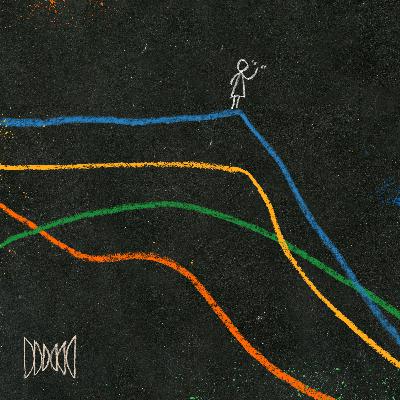




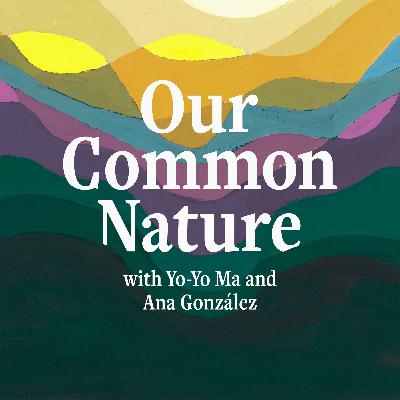
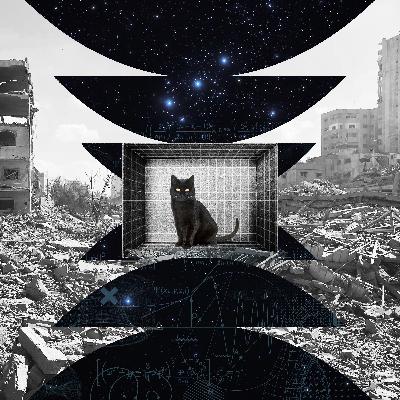

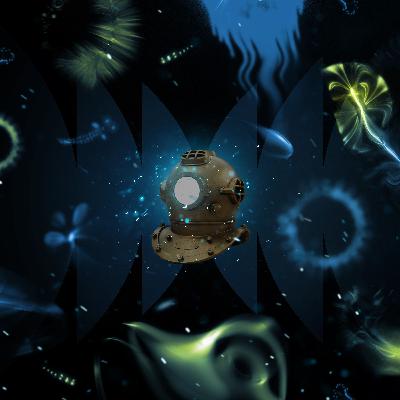
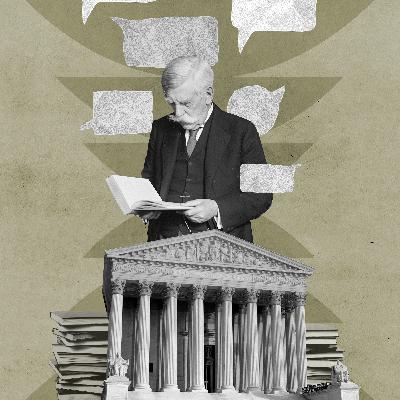
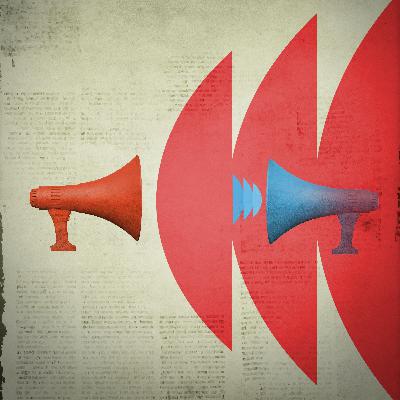
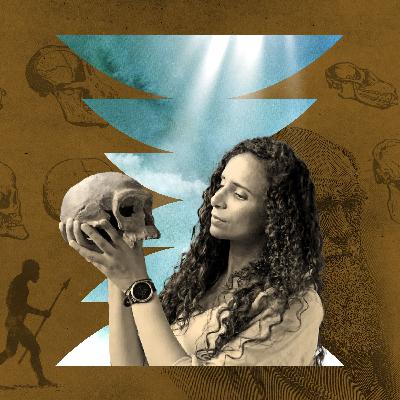
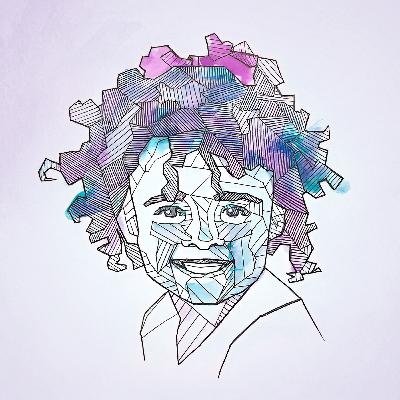





Could it be that when we say self-esteem, we could be referring to two different things? In other words, does the self-esteem come from something that could change from one day to the next (e.g. good grades or beauty) or does it come from a fundamental way of viewing yourself and the world around you (e.g. we are all unique and special)?
they were laurel branches probably( hence the name and references) not olive branches
my favorite episode
will have on these organisms
Fun fact: the first AI was actually trained to play the Chinese board game "Go" in the 50s.
This was the most relentlessly dumbed down episode of a "science" based podcast I've ever stuck with to the end. I really should have cut and run much sooner.
📉
"Fitness" does not mean how many babies you can make.
Quoting Darwin is the first mistake of this subject.
why does RadioLab allow for an unnuanced interpretation of current events that states to gullible audiences that Israel is fighting a war against no one and where aid isn't deliberately hoarded by terror groups for media outrage and recruitment and profit?
When you're making a scientific point, you're making a scientific point. If you don't do it because others might get upset, or their world would collapse, you're not a scientist, you're a hypocrite.
Ok, I'm convinced about the whole mixtapes thing. Great story.
There should be a warning for entirely Lulu-driven episodes, so we know that it will contain no depth or complexity, just a poem or two that makes her believe otherwise.
These two pieces are fantastic each in their own way! the only kind of music l listen now is the one you describe without arch, or beginning and ending, without a story, a refrain. started with Eno then Minimal now Stars of the Lid, these soundscapes are the only music l can tolerate now to keep my mood mine... thanks for sharing Jad!
ohh my... I almost cried at work. So many aspects of this caught me. The pursuing of your dreams to explore the stars. The massive loss. The human connectednes. All of it!
clan of the cavebear anyone?
rerun
i uvlllkl ihhhhhhhhhii je 3d
why marvel at a couple measly photons from an onion when you have fireflies, angler fish and dinoflagelates that actually do use bioluminescence?
not the first but the one I've cried the most with Radiolab. Cheers from Brasil, people